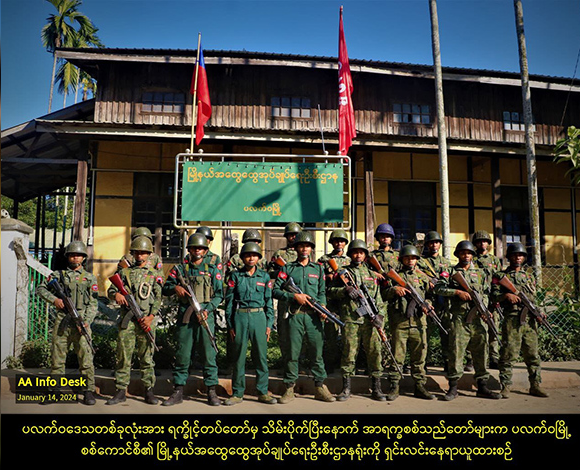Myanmar Spring Chronicle – January 14 by MoeMaKa Media:
Arakan Army (AA) Claims Full Control of Paletwa Region as Rakhine State Conflict Escalates
In a significant development, the Arakan Army (AA) declared its successful takeover of the entire Paletwa area in Rakhine State, marking an intensification of the conflict that had seemingly abated with a verbal ceasefire agreement in November 2022. The AA and the Military Council had agreed to a temporary truce; however, hostilities reignited on November 13, 2023, culminating in the recent claim of full control over Paletwa by the AA.
Paletwa, situated within Chin State in terms of territorial administration, is home to the Khumi ethnic group. Despite its administrative affiliation with Chin State, the region’s trade and communication routes connect it more closely with Rakhine State. The strategic importance of Paletwa is underscored by its proximity to India and Bangladesh, contributing to its role as a key military base and an economically strategic region.
Historically, Paletwa has been a battleground, witnessing fierce clashes during previous conflicts. This time, the AA’s military strength, improved weaponry, and strategic lessons learned from past engagements contributed to its success in capturing key hills and towns, including Nongbu, Tronai, Tinma, Meewa, and the town of Paletwa.
The recent surge in AA’s military successes comes at a time when the Military Council is engaged in simultaneous conflicts across Northern Shan State, Karenni State, Kachin State, and Sagaing Division, facing significant losses. The AA’s achievements in Paletwa may be attributed to this opportune moment.
Despite the temporary ceasefire agreement mediated by China to address the conflict in Northern Shan State, Rakhine State remains excluded from the truce. China’s focus on stability along its borders might explain its lack of pressure on the Rakhine conflict, as it is not a border region. The ongoing conflict, however, poses potential threats to China’s Kyaukphyu deep-sea port project and the Kyaukphyu-Kunming oil and natural gas pipeline.
While the AA celebrates its success in Paletwa, battles persist in the plains of Minbya and Pauktaw. Towns like Mrauk-U, Kyauktaw, Rathedaung, Minbya, and Pauktaw witness relentless fighting, causing civilian casualties, disrupting essential services, and creating food shortages. The blockade imposed by the Military Council on the import and export of goods and food has exacerbated the crisis, leaving Rakhine residents grappling with the impacts of war and food insecurity.
The situation in Rakhine State underscores the complex dynamics of Myanmar’s internal conflicts, revealing the deep-seated challenges faced by its diverse ethnic communities amidst political turmoil.

